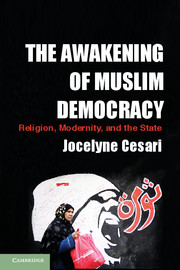Book contents
- Frontmatter
- Contents
- Acknowledgments
- Preface
- Part I THE MAKING OF ISLAM AS A MODERN RELIGION
- Part II ISLAMISM AS THE PREEMINENT POLITICAL FORCE PRE– AND POST–ARAB SPRING
- 7 Political Opposition through Islamic Institutions
- 8 Ideological Strength of Islamist Opposition
- 9 From Martyrs to Rulers
- Part III THE DISJUNCTION OF DEMOCRACY AND SECULARISM – LESSONS LEARNED FROM THE ARAB SPRING
- Appendix I Religious Violence Index
- Appendix II Egyptian Constitution, Ratified on December 26, 2012. Suspended on July 3, 2013
- Bibliography
- Index
- References
7 - Political Opposition through Islamic Institutions
Published online by Cambridge University Press: 05 July 2014
- Frontmatter
- Contents
- Acknowledgments
- Preface
- Part I THE MAKING OF ISLAM AS A MODERN RELIGION
- Part II ISLAMISM AS THE PREEMINENT POLITICAL FORCE PRE– AND POST–ARAB SPRING
- 7 Political Opposition through Islamic Institutions
- 8 Ideological Strength of Islamist Opposition
- 9 From Martyrs to Rulers
- Part III THE DISJUNCTION OF DEMOCRACY AND SECULARISM – LESSONS LEARNED FROM THE ARAB SPRING
- Appendix I Religious Violence Index
- Appendix II Egyptian Constitution, Ratified on December 26, 2012. Suspended on July 3, 2013
- Bibliography
- Index
- References
Summary
Precisely because they weren’t political parties, Islamic institutions were able to survive under authoritarian regimes. While political opponents often fled into exile or were jailed or killed, Islamic institutions became an underground rallying point for political opposition.
In almost all of the countries examined in this volume, rulers repressed political parties, but did not – and could not – completely eradicate religious institutions or activities. This fact is a key difference between Muslim authoritarian regimes and communist countries, where religious institutions were often systematically dismantled or outlawed. The maintenance of Islamic institutions has indirectly provided venues for political opposition. As Kai Hafez suggests, especially in “hard authoritarian states such as Iraq (under Saddam Hussein), Syria, Libya or Tunisia, it was and is impossible for an opposition to take shape in the first place, unless it moves abroad.... The only groups who make their presence felt as opposition forces in these states are Islamic fundamentalist organizations.”
Several types of religious institutions shaped political mobilization. First, mosques became spaces for political organization, and religious festivals turned into platforms for oppositional political discourse. Thus, a difference emerged between official Islam or state-run Islamic institutions (such as universities, mosques, and the Ministry of Religious Endowments) and unofficial Islamic institutions, which became vehicles for political opposition. As a result, religious authorities also became important actors in this underground resistance. In these circumstances, it should come as no surprise that, when allowed, political parties with an Islamic component emerged as the most influential political force.
- Type
- Chapter
- Information
- The Awakening of Muslim DemocracyReligion, Modernity, and the State, pp. 123 - 166Publisher: Cambridge University PressPrint publication year: 2014



